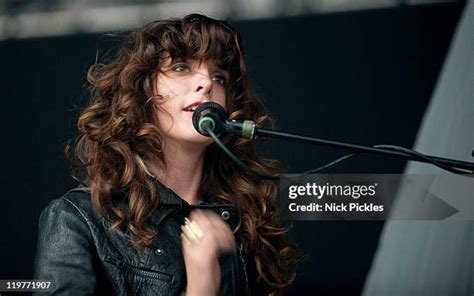The dreamy soundscapes and languid melodies of Beach House, a duo that has captivated audiences with their ethereal and introspective music, are deeply rooted in the creative vision of Victoria Legrand. As the lead vocalist and keyboardist of the band, Legrand’s distinctive voice and artistic perspective have been instrumental in shaping the unique sound and aesthetic of Beach House.
From their inception in 2006, Beach House, comprising Victoria Legrand and Alex Scally, has been on a journey to explore the depths of dream pop, indie rock, and electronic music. Their debut album, Beach House, introduced the world to their enchanting sound, which was further refined and expanded upon in subsequent releases such as Devotion, Teen Dream, and Bloom. Each album has been a testament to the duo’s evolving artistry and their ability to craft music that is both deeply personal and universally relatable.
Victoria Legrand’s voice is perhaps the most recognizable element of Beach House’s sound. Her vocal delivery is characterized by its soft, velvety texture and a range that effortlessly glides between the hauntingly beautiful and the deeply introspective. Legrand’s singing style is not just a technical proficiency but an emotional expression that conveys the complexity and depth of the lyrics she writes. Whether she is exploring themes of love, loss, or existential questioning, her voice remains a compelling instrument, drawing listeners into the intimate and often surreal world of Beach House.
The creative process of Beach House is deeply collaborative, with Legrand and Scally working closely together on every aspect of their music, from songwriting and recording to producing and visual aesthetics. This partnership has resulted in a body of work that is remarkably consistent in its thematic and sonic coherence. Albums like Depression Cherry and 7 have seen the duo experiment with their sound, incorporating new textures and themes while maintaining the essence of their dreamy, hypnotic music.
One of the significant aspects of Beach House’s appeal is their ability to balance the ornate with the intimate. Their songs often feature lush instrumentation, including shimmering keyboards, distorted guitars, and driving drum machines, yet they manage to create a sense of closeness and vulnerability. This dichotomy is reflective of Victoria Legrand’s approach to songwriting, which often explores the contrast between the inner, personal world and the external, more abstract landscapes of sound and emotion.
Outside of her work with Beach House, Victoria Legrand has been involved in various side projects and collaborations, showcasing her versatility as a musician and her willingness to explore different creative territories. Her contributions to the music world extend beyond her own band, influencing a generation of musicians and fans alike with the distinctive sound and style of Beach House.
In conclusion, Victoria Legrand is a pivotal figure in the musical landscape of the 21st century, her work with Beach House leaving an indelible mark on the genres of dream pop and indie rock. Through her enchanting voice, thoughtful lyrics, and collaborative spirit, Legrand continues to push the boundaries of what music can express and evoke, creating a legacy that is as hauntingly beautiful as it is profoundly meaningful.
What is the characteristic of Victoria Legrand's voice in Beach House?
+Victoria Legrand's voice is known for its soft, velvety texture and a range that effortlessly glides between the hauntingly beautiful and the deeply introspective, making it a distinctive element of Beach House's sound.
How would you describe the creative process of Beach House?
+The creative process of Beach House is deeply collaborative, with Victoria Legrand and Alex Scally working closely together on every aspect of their music, from songwriting and recording to producing and visual aesthetics, resulting in a remarkably consistent body of work.
What themes do Beach House typically explore in their music?
+Beach House explores a wide range of themes in their music, including love, loss, existential questioning, and the contrast between the inner, personal world and the external landscapes of sound and emotion, creating a rich and introspective musical experience.
The dreamy, ethereal soundscapes of Beach House, coupled with Victoria Legrand's haunting vocals, have captivated audiences worldwide, cementing their position as one of the most beloved and respected bands in the indie music scene.
| Album | Release Year | Description |
|---|---|---|
| Beach House | 2006 | Debut album introducing the band's enchanting sound. |
| Devotion | 2008 | Second album, further refining the band's unique sound. |
| Teen Dream | 2010 | Breakthrough album, exploring themes of love and introspection. |
| Bloom | 2012 | Fourth album, continuing the band's evolution and depth. |
| Depression Cherry | 2015 | Fifth album, marked by a return to a more intimate sound. |
| 7 | 2018 | Sixth album, featuring a more expansive and experimental approach. |

How to Explore Beach House's Discography

- Start with their debut album, "Beach House", to understand the foundations of their sound.
- Progress through their discography chronologically to appreciate the evolution of their music.
- Pay attention to the thematic development and sonic experimentation in each album.
- Listen to their music in different settings and moods to fully appreciate its depth and versatility.
Pros and Cons of Beach House’s Music

Pros
- Ethereal and enchanting soundscapes that are deeply immersive.
- Victoria Legrand’s haunting vocals add an emotional depth to their music.
- Their music explores a wide range of themes, making it relatable and engaging.
Cons
- Some listeners may find their music too dreamy or repetitive.
- The introspective nature of their lyrics might not appeal to everyone.
- Their sound, while unique, may not be as upbeat or energetic as other genres.

